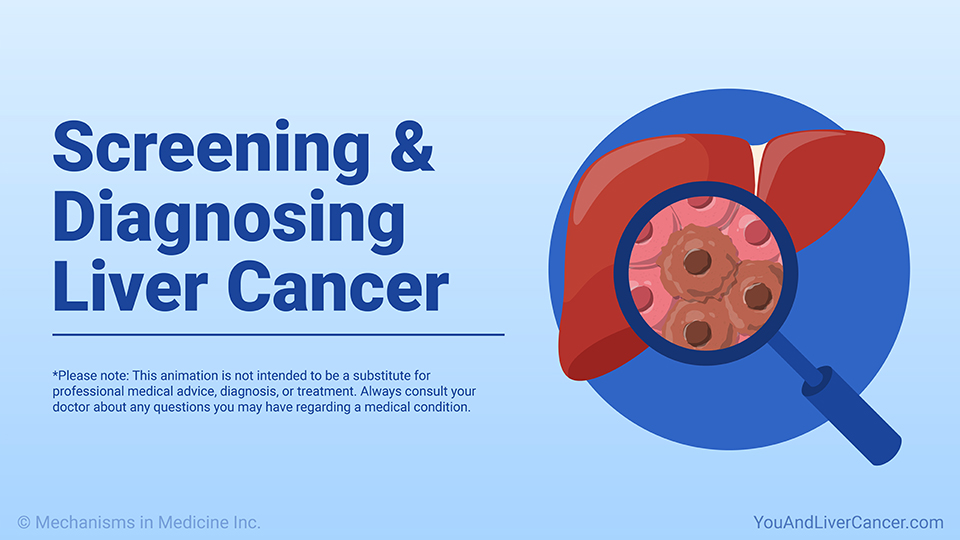Understanding Liver Cancer
*Please note: This slide show is not intended to be a substitute for professional medical advice, diagnosis, or treatment. Always consult your doctor about any questions you may have regarding a medical condition.
What is the liver?
The liver is the largest organ in your body. It performs many essential functions. For example, it helps remove toxins from your body and store necessary nutrients.
What is liver cancer?
Liver cancer is cancer that starts in the liver cells. It is called primary liver cancer or hepatocellular carcinoma (HCC). Other cancers may spread, or metastasize, to the liver. Only cancer that starts in liver cells is called liver cancer.
Types of liver cancer
HCC is the most common type of liver cancer. Nine out of 10 people with liver cancer have this type.1
Cancers that start in the bile ducts in the liver are called bile duct cancers, or cholangiocarcinoma.2 Fibrolamellar carcinoma is another cancer that affects the liver. It is more common among teens and young adults.3
Who is at risk for liver cancer?
Liver cancer is more common in men than in women. This is because male genetics enhance the development of liver cancer with exposure to certain risk factors.4 Liver cancer is more common in people over 60 than younger people.5
In the United States, racial and ethnic minorities have higher rates of liver cancer. American Indian and Alaska Native people have the highest rates,6 followed by people with Asian, Pacific Island, Hispanic, and Black ethnicities.5
More liver cancer risk factors
The main risk factor for liver cancer is underlying liver disease, which can lead to cirrhosis. More than 9 in 10 people with HCC have underlying liver disease.
Liver disease can be related to chronic hepatitis B or C, alcohol consumption, fatty liver disease (called metabolic dysfunction-associated steatohepatitis, or MASH), or rarer conditions such as hemochromatosis (when too much iron builds up in the liver) and primary biliary cirrhosis (when inflammation leads to damage of bile ducts in the liver).6,7
Liver cancer risk factors you can control
It is possible to control some risk factors for liver cancer.
The best way to prevent liver cancer is vaccination for hepatitis B and treatment for hepatitis B or C.
Avoiding too much alcohol, maintaining a healthy weight, treating diabetes, and not smoking are also recommended.
Social stigma of liver cancer
Due to lifestyle choices, some people may feel embarrassed about having liver cancer. It's important to get support and connect with others who understand your experience.
Blue Faery is a liver cancer advocacy and support group that can help. Visit bluefaery.org to learn more or find a support group.
What are the early symptoms of liver cancer?
Symptoms of liver cancer can be mild or nonexistent at first.
You may notice abdominal pain and discomfort, especially in the upper right quadrant where your liver is located.
Your skin and eyes may have a yellow tinge. You may feel bloated, nauseated, or less hungry than usual, or very tired.
However, many people with liver cancer do not have symptoms, particularly when the tumor is small. This makes it even more important to get screened if you have high liver cancer risk.
Later symptoms of liver cancer
When liver cancer is more advanced, symptoms may include:
- A distended belly, called ascites
- Dark urine
- Fatigue
- Weight loss
- Jaundice, a yellow tinge to your skin and eyes
- Changes in mental state
Finding the right liver cancer care team is important
If you or someone you love has liver cancer, it is important to find a doctor who specializes in treating it.
Treatment at a cancer center where doctors from different specialties work together to treat liver cancer can give you a better outlook.
Liver cancer staging, treatment, and clinical trials
You will have tests to determine the stage of your liver cancer and learn which treatments are available.
Through a cancer center, you will probably have more access to clinical trials, which may allow you to be treated with new liver cancer treatments that are still under evaluation.
Understanding liver cancer is the first step in your journey
Understanding liver cancer is the first step in your journey to treatment. Researchers are constantly developing new treatments, offering hope for your cancer journey and outcomes. It's important to stay informed, get support, and work closely with your doctor and medical team.
What’s the outlook for someone with liver cancer?
The outlook will depend on many factors, including the stage and type of liver cancer and your overall health, including liver function.
In general, earlier detection means a better outlook, including a higher chance of curative treatment.
Talk with your healthcare team to understand your treatment options and what you can expect. If there's anything you don't understand, ask for further explanation.
References
- Asafo-Agyei KO, Samant H. Hepatocellular carcinoma. StatPearls. Last revised: June 12, 2023.
https://www.ncbi.nlm.nih.gov/books/NBK559177
- Garikipati SC, Roy P. Biliary tract cholangiocarcinoma. StatPearls. Last revised: February 6, 2023.
https://www.ncbi.nlm.nih.gov/books/NBK560708
- Rees M. What are the different types of liver cancer? Medical News Today. Last revised: January 19, 2023.
https://www.medicalnewstoday.com/articles/liver-cancer-types
- US Centers for Disease Control and Prevention. Liver cancer. Last revised: November 15, 2022.
https://www.cdc.gov/cancer/liver/index.htm
- Blue Faery. The Adrienne Wilson Liver Cancer Association. Patient education for liver cancer. "A strong network offers confidence and strength."
https://www.bluefaery.org/patient-education
- National Cancer Institute. Liver cancer causes, risk factors, and prevention. Last revised: June 26, 2023.
https://www.cancer.gov/types/liver/what-is-liver-cancer/causes-risk-factors
- Mokdad AA, Singal AG, Yopp AC. Liver Cancer. JAMA. 2015;314(24):2701.
https://jamanetwork.com/journals/jama/fullarticle/2478205
Liver cancer is cancer that starts in the liver cells. It is called
primary liver cancer or
hepatocellular carcinoma (
HCC). This slide show provides an overview of
liver cancer including the different
types,
risk factors,
symptoms,
prevention,
outlook,
and more. If you or someone you love has liver cancer, understanding the disease is the first step in your journey to treatment. It's important to stay informed, get support, and work closely with your doctor and medical team. The
outlook will depend on many factors, including the stage and type of liver cancer and your overall health, including liver function. In general,
earlier detection means a better outlook, including a higher chance of curative treatment. Talk with your healthcare team to understand your treatment options and what you can expect. If there's anything you don't understand, ask for further explanation.
-
Share with family and friends:
Click here to take our SURVEY
Your feedback is important to us! We will use your feedback to develop future areas of content about liver cancer which will help other patients, caregivers, and families.

































